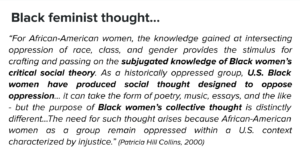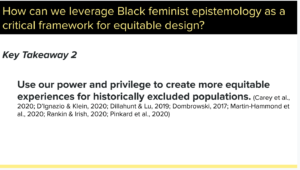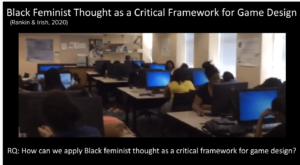AR2021-Black Feminist Epistemology as a Critical Framework for Equitable Design (Yolanda Rankin, Assistant Professor at Florida State University)

—> Delighted to be with everyone to talk about how we can use black feminist epistemology for equitable design

-
The global pandemic of Covid-19
-
Civil unrest over police-sanctioned brutality
-
Americans storming the US Capitol to stop the certification of electoral votes for an alleged “stolen” election

-
The bad are issues that reveal social inequities that are in society today

-
Excluded groups refer to people representative of less dominant social groups like women, African-Americans, LGBTQ+ community, etc.
-
Technology can be used to harm these groups

-
The study found that facial recognition technology was biased towards mistakenly identifying people of color as criminals
-
As researchers, we need to be careful that our innovations don’t impact historically excluded groups

-
We can figure out what questions to investigate, data to collect
-
For example, when deaf students are part of mainstream classes, all the students learning American Sign Language boosts everyone’s English literacy

-
How data is collected in their communities
-
How that data is used

-
Overview of Black Feminist Epistemology
-
Using Black Feminist Epistemology in the context of the gameplay experience, and its impact for Black women
-
Black feminist theory as a framework for game design

-
Shared collective thought for Black women of “outsider within” status
-
My push is that what matters for Black women is just as important as any social group

-
This is important for understanding black women’s experiences


-
Black feminist thought is distinct because African-American women remain oppressed in a US context characterized by injustice


—> Remember, our first takeaway was understanding how gaming plays in oppression of historically excluded groups

-
For Kim Belair, when we look out into world or gaming sub-culture we have internal model of what gamer is
-
This model reflects more white/Asian men who live/breathe gaming

-
There are few studies of how Black women play video games
-
We asked to figure out gaming behaviors, practices, and trends of Black women, since they are invisible in core gaming experience
-
Then had focus group questionnaire, to figure out motivating factors for why/why not play games

-
They were busy with studies, work, extra-curricular
-
Played games when younger

-
If you think about the fact that mobile games play leads to a solo game experience, compared to massive online role playing games, where you are exposed to people with implicit biases
-
As a result, mobile games lead to more positive gaming experience

—> Now for takeaway two, we are using our power and privilege as designers, to create a level playing field where Black women are producers of games, as well as consumers

-
I wanted to see Black women produce the games they want to see in the world


-
At Spelman, resiliency and strength positions women as agents in fight against social injustice

-
Black feminist thought is knowledge of black women’s experiences, and how slavery and its consequences impacted their lives
-
So she allowed black women to own the design process for the proposed mobile game from end-to-end, which included:
-
Defining design elements
-
Rules
-
Character sketches and coming with game task
-

-
An avatar called Sophia guides you into making Spanish dishes, and uses Spanglish to help people learn the Spanish language
-
For example, a player sees a recipe for particular Spanish dish, and Sophia introduces the ingredients in Spanish, and then asks players for specific ingredients out of two
-
-
Spanish is most popular foreign language people study at Spelman
-
Spelman also has a requirement of having two year proficiency in foreign language of choice
-
So the game would help black women gain language acquisition
-

-
Black women also acted as co-designers in this process


—> Moving from black feminist thought to motivate game design, we found three key findings

-
From Jennifer, i.e. there are Black Spanish people, but who are not represented
-
Hard for her to see educational games with speakers who are also Black
-


-
Remember, Black women come in all shapes and sizes, and how they are portrayed in digital media needs to vary as well

-
Advocated for self-definition as the ability to control narrative of who they are, and how they are represented


—> In this sweet spot of innovation, where we are accommodating everyone, that we can have transformative technology for all

-
They can position themselves as experts
-
Recognized different perspectives and opinion,
-
This is the sweet spot of innovation, so you can design technology that can benefit all


-
Any tactical advice on how to bring a black feminist epistemological framework to analysis & synthesis specifically (e.g. frameworks for qualitative data analysis)?
-
Asked to interact with people and researchers to analyze and framework from Black feminist epistemology
-
How do you have a conversation with folks who try to invalidate the existence of oppression and these different experiences (sometimes they are black or minority folks themselves)? They claim it plays into “victim mentality” and that it doesn’t push folks to “do better”. It may even feel like a form of gaslighting and that they’ve bought into the supremacy story, so the conversation stops there?
-
Rather it leaves you in the place of resiliency and focuses on call to action

